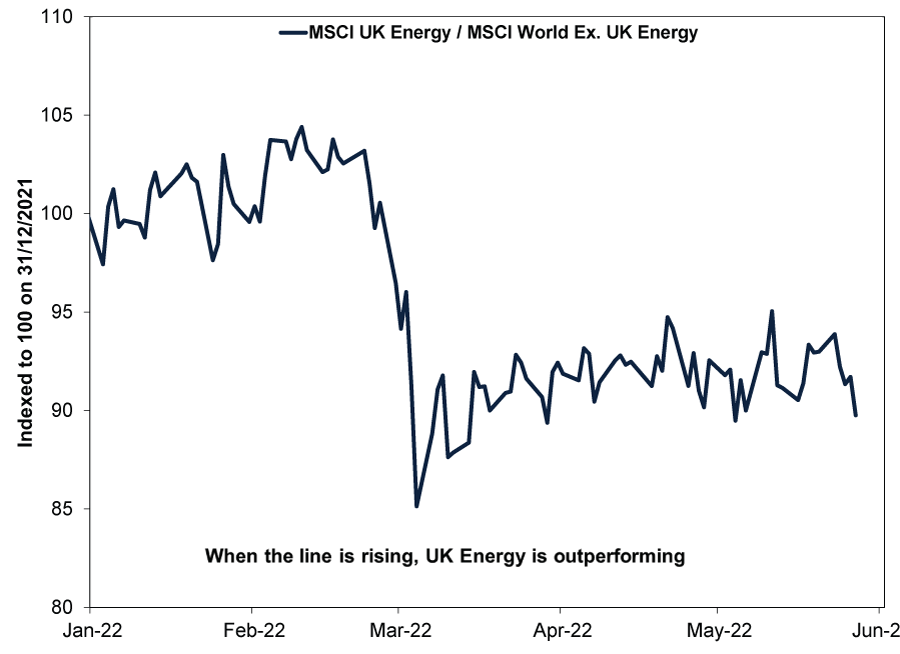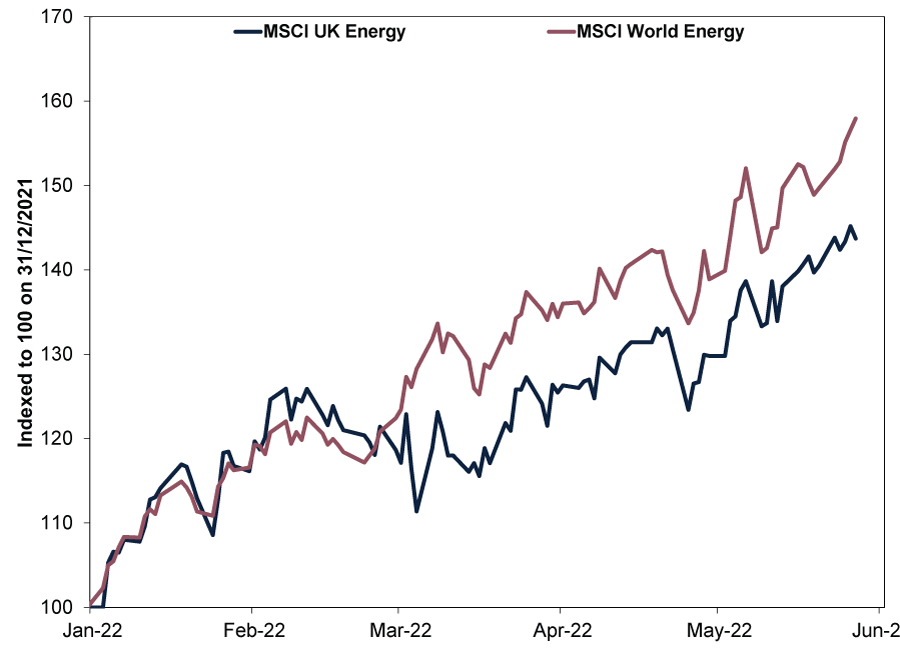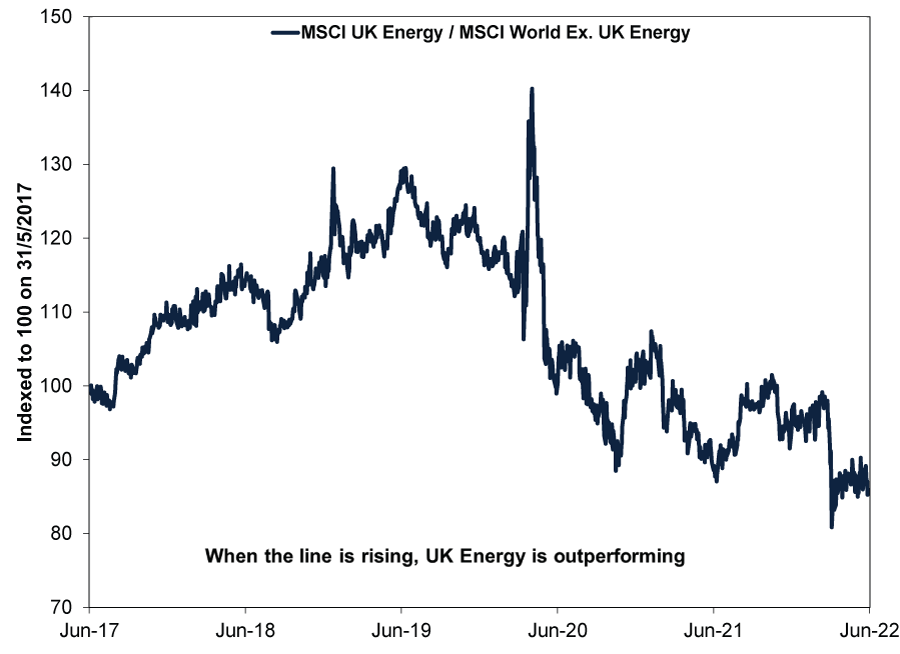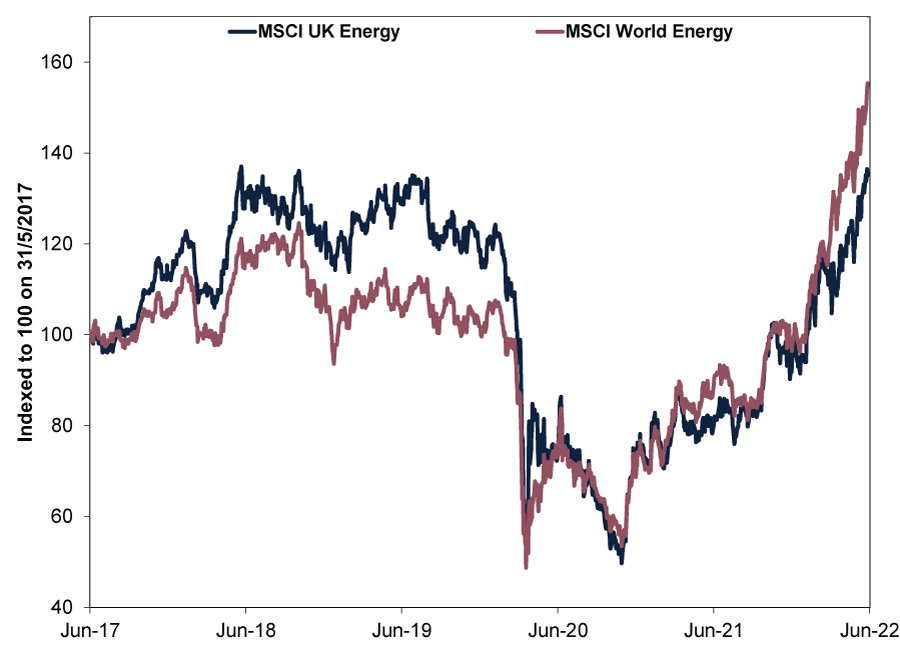Personal Wealth Management / Market Analysis
Our Perspective on Britain’s Oil and Gas ‘Windfall Profit’ Tax
Windfall profit taxes have landed in Britain, but the market impact seems minimal to us.
Editors’ note: MarketMinder Europe is politically agnostic—we aren’t for or against any party, politician or policy. Our analysis seeks only to determine political actions’ potential economic and market impact.
Last Thursday, bowing to public pressure, Prime Minister Boris Johnson’s government seemingly reversed a late-March decision and announced it would impose a 25% windfall profit tax on oil and gas firms.[i] Whilst we don’t think windfall taxes are great, especially for the UK’s Energy sector, it is small in scope when viewed globally—and smaller than many commentators we follow initially anticipated, which likely limits its impact.
Chancellor of the Exchequer Rishi Sunak designed the energy levy to fund subsidies for households facing higher energy bills, with energy regulator Ofgem warning of another 40% hike to energy price caps in October.[ii] The popularity of such a measure seems understandable to us. Although we sympathise with households’ plight, we don’t think redirecting the Energy sector’s profits is necessarily the best way to alleviate energy price pressures.
Windfall profit taxes, as the name implies, are extraordinary tax rates applied to industries enjoying a sudden increase in profits. Some governments apply them retroactively, but the UK’s tax will apply only from 26 May onward. Whilst we think the decision not to backdate the new levy is beneficial for markets, as it eases some uncertainty, the decision to temporarily raise the tax rate on UK oil and gas profits from 40% to 65% likely won’t be free of consequences.[iii] A windfall tax discourages investment in future production—a key to mitigating rising prices, in our view. In our experience, the Energy business is highly cyclical, meaning it is prone to booms on the upswing—like now—but also busts during downturns: Years of plenty often precede prolonged profit droughts, such as during 2014 – 2016’s oil price collapse, from which the sector is only now recovering.[iv] When profits are high, companies not only boost output, they repair their balance sheets for when times are lean—like they are presently.[v] We think windfall taxes limit firms’ flexibility and potentially reduce their longer-term resiliency. Note that the new tax expressly forbids firms from using past losses to reduce their windfall tax bill, which we think deprives businesses of a crucial strategy to maintain stability over time.[vi] If more capacity is the real solution, as we think it is, we fail to see how a windfall tax is a step in that direction.
The windfall tax does provide an 80% investment allowance, so companies can reduce their liability by directing profits to capital expenditures in UK oil and gas production, blunting the effect.[vii] But we think less of a blow is still a blow: There wasn’t a disincentive before, and now there is. Companies invest to boost profits, so forcing them to channel that in a particular direction is a headwind, in our view, even if it is a smaller one than an unmitigated windfall profit tax. Two large Energy firms have already warned that they are re-evaluating their planned North Sea oil and gas investments as a result of the change.[viii]
Sunak bills the windfall tax as “timely, targeted and temporary,” but how long it will last exactly isn’t clear.[ix] The legislation includes a clause sunsetting the tax in December 2025, but the government’s official proposal mentions ending the tax sooner “if oil and gas prices return to historically more normal levels.”[x] Then, too, a key uncertainty we saw hanging over markets was whether levies would include electrical power generators. Sunak spared them, which may have helped clear up some uncertainty—but he still left the door open to the windfall tax’s expansion at a later date.
All that said, we don’t think this is a huge negative. Sunak expects the plan to raise around £5 billion this year, and whilst that might take a good chunk from UK Energy—about a fifth of last year’s roughly £25 billion in profits—analyst estimates still project the sector to double after-tax profits this year.[xi] Besides, as we will explain, we think markets have largely pre-priced the hit already—it looks mostly like a one-off flesh wound, rather than a longstanding headwind.
UK Energy stocks, like the rest of the world’s, have been on a tear this year.[xii] So to see the UK tax’s possible market impact, we think it helps to consider Exhibit 1, which shows the MSCI UK Energy Index’s returns relative to developed world Energy stocks outside the UK. When the line is rising, UK Energy stocks are outperforming the rest of the world’s. We wouldn’t read too much into short-term moves, but late-February/early-March windfall tax talk seemed to hit UK Energy sentiment then. For example, on 2 March, Spain extended its windfall tax, introduced last September, by six months.[xiii] This came as speculation swirled amongst commentators we followed of a potential UK windfall levy, with the Labour Party pushing for it.
Exhibit 1: Windfall Taxes Seem to Hit Sentiment
Source: FactSet, as of 31/5/2022. MSCI UK Energy divided by MSCI World ex. UK Energy returns with net dividends, 31/12/2021 – 30/5/2022. See our annex below for a longer-term version of this chart.
But by March’s end, the UK had seemingly ruled out a tax.[xiv] We think the causation is open to interpretation, but UK Energy stocks’ relative performance seemingly improved, suggesting to us uncertainty over the UK’s policy U-turn, which last Thursday’s announcement confirmed, was a one-off sentiment hit.
In the grand scheme of things, we think the UK’s windfall tax looks more like political theatre than a punch. Despite some sentiment-driven market impact, the impact seems small. Exhibit 2 shows UK Energy returns next to World Energy. Taxing extraordinary profits may make sense politically—and that appears to be a headwind for UK Energy’s relative returns—but it hasn’t kept overall returns from rising strongly.[xv] Tax uncertainty appears negligible to us next to Energy’s main fundamental earnings drivers—oil prices and the global supply and demand trends behind them—which propelled the sector higher this year as energy costs spiked more than many expected.
Exhibit 2: Fundamentals Matter More
Source: FactSet, as of 31/5/2022. MSCI UK Energy and World Energy returns with net dividends, 31/12/2021 – 30/5/2022. See our annex below for a longer-term version of this chart.
Just as windfall taxes aren’t likely to suppress UK Energy much, in our view, they aren’t broad enough to hit global markets, either. UK oil and gas output is only about 1% of the world’s—not huge.[xvi] Similar measures from Spain and Italy made fewer ripples, with affected companies not seeing a material impact.[xvii] Meanwhile, Emerging Market Hungary announced windfall taxes last Thursday, too, affecting much broader swaths of its markets—including banks, telecom firms, retailers and airlines, along with Energy firms—unnerving investors there.[xviii] We are watching for any wider spread. But whilst these moves aren’t good, in our view, their scope and effect seem too small to cause bigger global waves for now.
Annex
A Longer Look at UK Energy Relative to Developed World Energy Ex. UK
Source: FactSet, as of 31/5/2022. MSCI UK Energy divided by MSCI World ex. UK Energy returns with net dividends, 31/5/2017 – 31/5/2022.
A Longer Look at UK and World Energy
Source: FactSet, as of 31/5/2022. MSCI UK Energy and World Energy returns with net dividends, 31/5/2017 – 31/5/2022.
[i] “UK Slaps 25% Windfall Tax on Profits of Oil and Gas Firms,” Joe Mayes, Bloomberg, 26/5/2022. Accessed via Yahoo! News.
[ii] Ibid.
[iii] “Energy Profits Levy Factsheet – 26 May 2022,” HM Treasury, 26/5/2022.
[iv] Source: FactSet, as of 31/5/2022. Statement based on Brent crude oil price per barrel, 19/6/2014 – 20/1/2016.
[v] “US Oil and Gas Shares Will Continue to Gain as Debt Is Paid Off, Analysts Say,” Bill Holland, S&P Global, 18/1/2022.
[vi] “Energy Profits Levy Factsheet – 26 May 2022,” HM Treasury, 26/5/2022.
[vii] See note i.
[viii] “Shell Says Windfall Tax Threatens North Sea Oil and Gas Investment,” Alex Lawson, The Guardian, 27/5/2022.
[ix] Ibid.
[x] See note vi.
[xi] Source: FactSet, as of 31/5/2022. MSCI UK Energy EPS estimates, 2021 – 2022. “UK Hits Oil and Gas Companies With $6 Billion Windfall Tax,” Anna Cooban, CNN, 26/5/2022.
[xii] Ibid. Statement based on MSCI UK Energy and World Energy returns with net dividends, 31/12/2021 – 30/5/2022.
[xiii] “Spain Extends Emergency Energy Measures Amid Ukraine Crisis,” Pablo Bronte, Montel News, 2/3/2022.
[xiv] “UK Rules out Windfall Tax on North Sea Oil Firms to Help Fund Energy Bills,” Rob Davies and Mark Sweney, The Guardian, 29/3/2022.
[xv] Source: FactSet, as of 31/5/2022. Statement based on MSCI UK Energy and World Energy returns with net dividends, 31/12/2021 – 30/5/2022.
[xvi] Source: US Energy Information Administration, as of 31/5/2022.
[xvii] “Enel Sticks to Guidance as Q1 Boosted by New Green Capacity, Asset Sale,” Stephen Jewkes, Reuters, 4/5/2022. Accessed via Nasdaq.com.
[xviii] “Hungary’s Orban Turns Again to Windfall Taxes on Banks, Companies to Plug Budget,” Staff, Reuters, 25/5/2022. Accessed via U.S. News & World Report.
Get a weekly roundup of our market insights.
Sign up for our weekly e-mail newsletter.

You Imagine Your Future. We Help You Get There.
Are you ready to start your journey to a better financial future?

Markets Are Always Changing—What Can You Do About It?
Get tips for enhancing your strategy, advice for buying and selling and see where we think the market is headed next.








